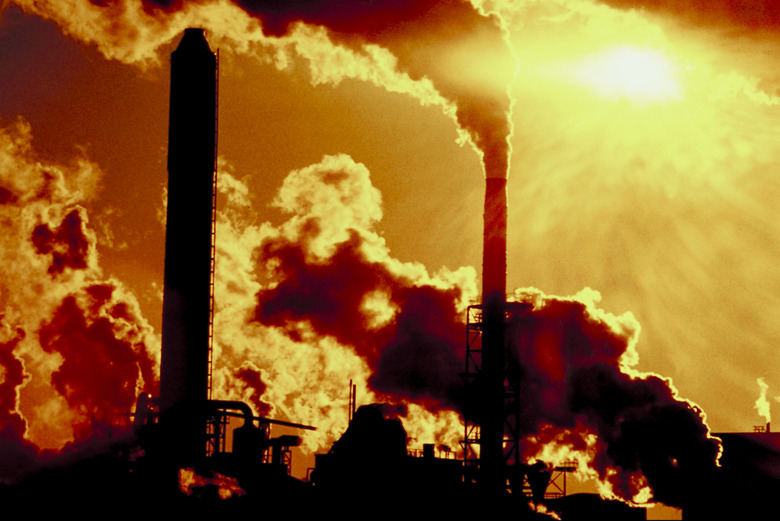How Humans Disrupt The Ecosystem
Humans affect ecosystems both directly and indirectly, and these effects can range from minimal to catastrophic. Through fossil fuel combustion, humans have disturbed the makeup of the breathable air, changed the quality of the soil and water and have altered the types and distributions of plants and animals around the globe. These effects can act singularly, though they more frequently act in concert with one another within ecosystems.
Pollution
Pollution
Since the Industrial Revolution, humanity's reliance on the combustion of fossil fuels has led to changes in atmospheric carbon dioxide concentrations, the frequency and intensity of atmospheric ozone and smog, and the production of other potent greenhouse gases such as nitrous oxide and methane. Further, increases in agricultural production and the use of nitrogen-based fertilizers have depleted essential soil nutrients, increased the transport of nitrogen and phosphorus to streams and rivers and led to the degradation of water quality.
Biodiversity
Biodiversity
As the human population increased, the amount of land needed to house and feed everyone also has increased. To accommodate the increasing population, habitat critical for other plants and animals has decreased, leading to reduced populations of various birds, fish, mammals and plants. Prior to human encroachment, some keystone species, such as the gray wolf, were critical in maintaining populations deer populations, one of their primary food sources. Deer populations have increased throughout the nation due to lack of predation by gray wolves, becoming pests in many communities.
Interactive Effects
Interactive Effects
As in all ecosystems, many, if not all, components are connected in one way or another. Therefore, alterations to one component, such as soil quality, can affect other components, such as water quality and biodiversity. For example, excess fertilizer application in the agricultural Midwestern United States has led to degraded water quality throughout the Mississippi River watershed, including the hypoxic, or oxygen-degraded, zone of the Gulf of Mexico, which influences local and regional fisheries.
Solutions
Solutions
While not all impacts on ecosystems are reversible, there are several ways to minimize and reverse human-induced adverse effects. Green technologies that reduce reliance on fossil fuels, decrease waste and have low carbon footprints can make measurable differences on the quality of multiple ecosystems. For example, utilizing public transportation and car-pooling can reduce gaseous carbon emissions, alternative energy sources produce fewer atmospheric contaminants and reducing the reliance on large-scale agriculture can help reduce soil and water pollution by minimizing excessive use of synthetic fertilizers.
Cite This Article
MLA
Martonas, Jonas. "How Humans Disrupt The Ecosystem" sciencing.com, https://www.sciencing.com/humans-disrupt-ecosystem-5968/. 24 April 2017.
APA
Martonas, Jonas. (2017, April 24). How Humans Disrupt The Ecosystem. sciencing.com. Retrieved from https://www.sciencing.com/humans-disrupt-ecosystem-5968/
Chicago
Martonas, Jonas. How Humans Disrupt The Ecosystem last modified August 30, 2022. https://www.sciencing.com/humans-disrupt-ecosystem-5968/
